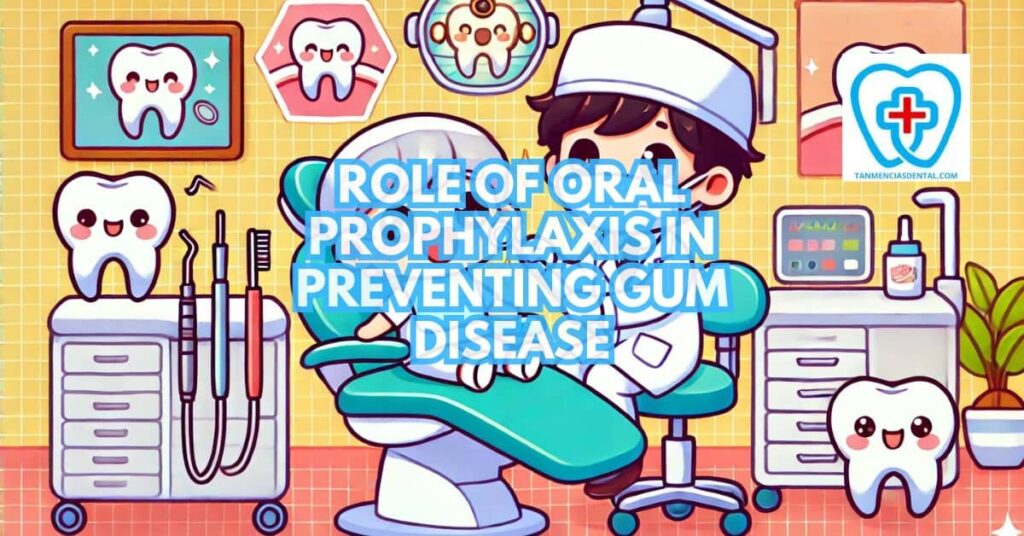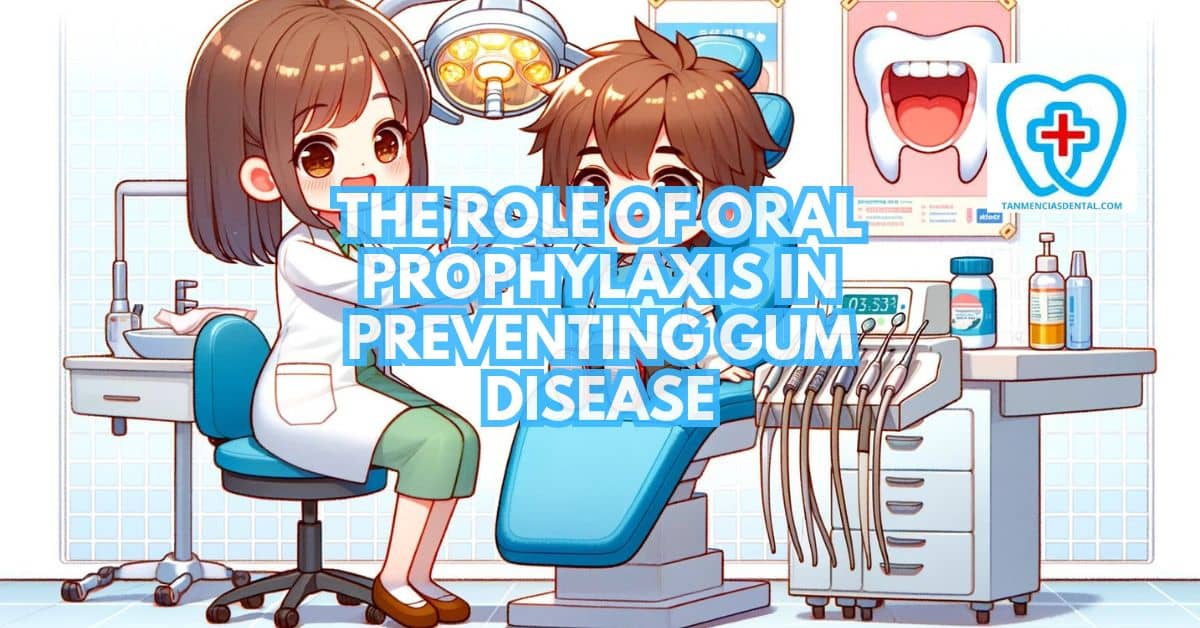The role of oral prophylaxis in preventing gum disease is important for keeping teeth and gums healthy.
This dental cleaning removes plaque and tartar that regular brushing often misses, especially below the gum line.
By stopping these harmful substances early, it helps prevent gum problems like swelling, bleeding, and infection.
Dentists recommend getting oral prophylaxis twice a year to lower the risk of serious dental issues.
It also gives your dentist a chance to spot other problems before they get worse.
1. Understanding Gum Disease: From Gingivitis to Periodontitis
Gum disease is a widespread condition that can significantly affect your oral health, starting with the gums becoming red, swollen, and prone to bleeding.
This early stage, known as gingivitis, can escalate into periodontitis if not addressed promptly.
Periodontitis is more severe, with the gums retracting from the teeth and forming harmful pockets of infection that can destroy the jawbone and lead to the loss of teeth.
The main culprit behind gum disease is plaque, a viscous layer of bacteria constantly forming on your teeth.
Regular teeth cleaning by dental professionals play a crucial role in scraping away plaque and stopping it from hardening into tartar, a calcified deposit that exacerbates gum irritation.
Preventing periodontal disease requires a commitment to maintaining good oral health through consistent dental visits for checkups and cleanings.
By taking these proactive steps, you can protect your gums from disease, ensuring a healthier mouth and a brighter smile.
🦷 How Much Does It Cost to Fix a Chipped Tooth?
2. What is the Purpose of Oral Prophylaxis?
The primary purpose of oral prophylaxis is to prevent the onset and progression of gum disease by thoroughly cleaning the teeth and gums.
It involves the removal of plaque and tartar, which are the main causes of gum disease, from above and below the gum line.
This procedure not only helps in maintaining gum health but also prevents the occurrence of cavities and bad breath, contributing to overall oral hygiene.
Oral prophylaxis is also a preventive strategy against more severe dental problems, serving as an early detection system for issues that could become significant if left untreated.
Through regular oral prophylaxis, dentists can provide personalized advice and interventions to address the specific oral health needs of their patients.
🦷 How Braces Can Affect Gingivitis: What You Should Know
3. The Importance of Oral Prophylaxis in Dental Care
Oral prophylaxis is a key element of dentistry, serving as an essential preventive measure against the buildup of plaque and tartar, which are major contributors to gum disease.
This dental procedure involves a thorough cleaning that goes beyond the reach of regular brushing and flossing, effectively minimizing the risk of gum inflammation and infection.
By regularly removing these harmful substances, oral prophylaxis aids in maintaining the health and longevity of both teeth and gums, thus preventing tooth loss.
The link between oral health and overall physical health is well-documented, with studies showing a connection between poor oral hygiene and serious conditions like heart disease and diabetes, highlighting the broader implications of oral prophylaxis.
Regular dental visits for prophylaxis are not just about cleaning; they provide an opportunity for dentists to perform scaling and root planing where necessary.
This deeper cleaning process addresses the roots of the teeth, removing plaque and tartar from below the gum line, which is crucial for patients showing early signs of gum disease.
Encouraging the practice of regular oral prophylaxis reinforces the importance of preventive care in dentistry, ensuring long-term health and well-being.
🦷 How Much Does It Cost to Fill Cavities?
4. Benefits of Dental Prophylaxis: A Shield Against Gum Disease
Dental prophylaxis acts as a critical shield, protecting teeth and gums from the onset of gum disease.
This procedure effectively removes plaque and tartar, which, if left untreated, can lead to gingivitis and eventually periodontitis.
Beyond preventing gum disease, dental prophylaxis contributes to fresher breath and a brighter smile, enhancing personal confidence.
Regular cleanings also provide an opportunity for dental professionals to detect early signs of problems, such as cavities or broken fillings.
Ultimately, the benefits of dental prophylaxis extend beyond oral health, supporting a person’s overall quality of life by preventing diseases that could affect their general health.
🦷 How Do Dentists Treat Gingivitis? Don’t Let Gum Disease Take Over!

5. Preventing Future Dental Issues with Regular Oral Prophylaxis
Engaging in regular oral prophylaxis is a proactive approach to dental care, designed to prevent future dental issues.
Regular cleanings help remove plaque and tartar that can lead to oral health problems such as cavities and gum disease.
Additionally, oral prophylaxis can help remove stains from your teeth, keeping them looking bright and clean.
By identifying and addressing minor issues early, patients can avoid the discomfort and expense of procedures like root canals, extractions, or gum surgery.
Dentists can monitor the health of your mouth over time and make necessary adjustments to your care.
This ongoing attention to oral health problems ensures a healthier mouth and reduces the likelihood of dental emergencies.
Maintaining good oral hygiene through regular cleanings supports overall well-being and a more stable state of health.
🦷 How Does Coconut Oil Help Whiten Your Teeth?
6. Tackling Plaque and Tartar: The Enemies of Oral Health
Plaque and tartar are formidable enemies of oral health, directly contributing to gum disease and tooth decay.
Plaque, a sticky film of food debris, bacteria, and saliva, can harden into tartar when not removed promptly, adhering strongly to teeth and beneath the gum line.
Because tartar is difficult to remove with regular brushing and flossing, it necessitates the use of professional dental tools.
Oral prophylaxis targets these substances specifically, meticulously cleaning the teeth to prevent their damaging effects.
By regularly removing plaque and tartar, oral prophylaxis helps maintain the integrity of the teeth and gums, safeguarding against inflammation and disease.
🦷 The Benefits of Brushing Your Teeth You Shouldn’t Miss
7. The Connection Between Oral Prophylaxis and Overall Health
Oral prophylaxis helps stop gum problems before they become more serious, like periodontal disease, which can damage both your gums and the bones that support your teeth.
Keeping your mouth healthy through good dental hygiene is also linked to better overall health.
Studies show that people with gum disease are more likely to have health problems like heart disease, diabetes, and stroke.
This is because harmful bacteria from the mouth can enter the bloodstream and affect other parts of the body.
A regular prophylaxis appointment not only keeps your teeth clean but also helps your dentist catch early signs of gum disease or other health concerns.
Taking care of your mouth is a simple way to lower your risk for bigger health issues.
That’s why maintaining dental hygiene and visiting the dentist for cleanings is important for your whole body, not just your smile.
🦷 How the Roles of a Dental Hygienist and Dentist Affect Your Oral Care
8. Customizing Oral Prophylaxis: Tailored Dental Care Strategies
Customizing oral prophylaxis to meet individual needs ensures that each patient receives the most effective care.
Dental professionals consider factors like a patient’s oral health history, the presence of restorations, and specific risk factors for gum disease to tailor their approach.
This personalized strategy can include targeted cleanings, the application of preventive treatments such as fluoride, and advice tailored to individual habits and lifestyle choices.
Such customization not only enhances the effectiveness of oral prophylaxis but also educates patients on maintaining their oral health between visits.
This approach ensures that oral care is not just a routine procedure but a tailored strategy to optimize dental health.
🦷 Why Dental Checkups Are Important at Every Age
9. The Role of Patients in Preventing Gum Disease
While dental professionals play a crucial role in maintaining oral health, the responsibility also significantly lies with the patients.
Effective daily oral hygiene practices, such as brushing twice a day, flossing, and using mouthwash, are essential in preventing plaque buildup and gum disease.
Patients are also encouraged to be mindful of their diet, avoiding excessive sugar and acidic foods that can harm teeth and gums.
Regular dental visits for prophylaxis and checkups enable early detection and treatment of issues, minimizing the risk of gum disease.
Patient education and involvement are key factors in preventing gum disease, highlighting the partnership between dental professionals and patients in achieving optimal oral health.
🦷 What Are the Hidden Downsides of Electric Toothbrushes?
10. Overcoming Barriers to Regular Oral Prophylaxis
Several barriers can prevent individuals from seeking regular oral prophylaxis, including fear, cost, and a lack of awareness about its importance.
Dental practices can address these barriers by providing a comfortable and reassuring environment, offering flexible payment options, and educating patients on the benefits of preventive care.
Initiatives like community dental health programs can also help increase awareness and access to dental services.
Overcoming these obstacles is essential for ensuring that a larger segment of the population benefits from preventive oral care.
By addressing these barriers, dental professionals can help more people maintain their oral health and prevent gum disease.
🦷 Brush Up on Brushing! Fun Facts About Taking Care of Your Teeth
11. Caring for Your Teeth After a Dental Cleaning
After a dental cleaning, it’s important to avoid eating or drinking anything too hot or too cold until the numbness from any anesthesia wears off.
For the rest of the day, choose soft foods and avoid anything sticky, crunchy, or hard.
Brush your teeth gently and floss carefully to keep your gums from getting sore.
Rinse your mouth with warm salt water if you feel any discomfort.
Most importantly, keep up with brushing twice a day and flossing daily to stop plaque from building up again.
12. Beyond Brushing: Identifying and Addressing Risk Factors for Gum Disease:
Gum disease can be caused by several risk factors, including smoking, diabetes, and a family history of the condition.
Smoking weakens the immune system, making it harder for the gums to heal.
People with diabetes are more prone to infections, including gum disease, due to higher blood sugar levels.
A family history of gum disease can also increase your risk, as genetics play a role in your oral health.
To reduce these risks, quit smoking, manage your blood sugar levels if you have diabetes, and maintain regular dental checkups to catch any early signs of gum disease.
🦷 Reputable Dental Clinic in Marikina
👨⚕️ Conclusion
The preventive power of oral prophylaxis in combating gum disease cannot be overstated.
Regular cleanings and tailored dental care strategies, serve as a foundational element in maintaining oral health and preventing the onset of gum disease.
The role of both dental professionals and patients is crucial in this preventive approach, with a shared responsibility towards maintaining oral hygiene and health.
Overcoming barriers to regular dental visits ensures that this vital care is accessible to all, highlighting the importance of oral prophylaxis in the broader context of health maintenance.
Oral prophylaxis is not just a dental procedure but a critical preventive measure, ensuring the health and longevity of one’s smile while contributing to overall well-being.
😊 Self-Promotion
Visit Tan-Mencias Dental Clinic in Parang, Marikina City, where your smile is our top priority!
Our friendly team is dedicated to providing you with the personalized, gentle care that you deserve.
Whether you have questions, need to schedule an appointment, or just want to chat about how we can help improve your oral health, we’re here for you.
Reach out to us anytime by calling 9171451074, sending a message through our Facebook page, or using the contact form on our website.
Let us be a part of your journey to a brighter, healthier smile.
We can’t wait to welcome you to our family!

